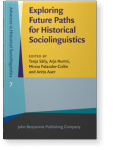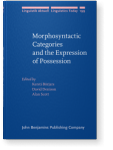Teo Juvonen
List of John Benjamins publications for which Teo Juvonen plays a role.
2017 “A graphic system which leads its own linguistic life”? Epistolary spelling in English, 1400–1800 Exploring Future Paths for Historical Sociolinguistics, Säily, Tanja, Arja Nurmi, Minna Palander-Collin and Anita Auer (eds.), pp. 187–213 | Chapter
Traditional accounts of the history of English spelling are primarily based on printed texts. According to them, English orthography developed from great diversity in Late Middle English to modern standard spelling by 1800. Studies have also revealed a split between public and private spelling… read more
2013 Variation in the form and function of the possessive morpheme in Late Middle and Early Modern English Morphosyntactic Categories and the Expression of Possession, Börjars, Kersti, David Denison and Alan K. Scott (eds.), pp. 35–58 | Article
This paper analyses the morphosyntactic nature of the possessive -s in the Late Middle and Early Modern English periods. As is well known, the possessive -s, or the inflectional genitive, was increasingly replaced by the of-possessive during the Middle English period (Mustanoja 1960; Fischer 1992;… read more
2010 Genitive variation in letters, history writing and sermons in Late Middle and Early Modern English English Historical Linguistics 2008: Selected papers from the fifteenth International Conference on English Historical Linguistics (ICEHL 15), Munich, 24-30 August 2008., Lenker, Ursula, Judith Huber and Robert Mailhammer (eds.), pp. 197–214 | Chapter
This paper analyzes genitive variation from about 1420 to 1640 in three genres, letters, history writing and sermons. The corpus material is selected from the Penn-Helsinki Parsed Corpus of Middle English, second edition (PPCME2), the Penn-Helsinki Parsed Corpus of Early Modern English (PPCEME) and… read more
2009 Everyday possessions: Family and identity in the correspondence of John Paston II The Language of Daily Life in England (1400–1800), Nurmi, Arja, Minna Nevala and Minna Palander-Collin (eds.), pp. 253–277 | Article
This study examines the linguistic and historical aspects of possession in the correspondence of John Paston II, a fifteenth-century Norfolk gentleman. The aim is to complement previous studies that analyze possessive constructions at a more general level by focusing on specific and everyday usage.… read more



